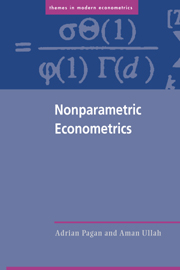Book contents
- Frontmatter
- Contents
- Preface
- 1 Introduction
- 2 Methods of Density Estimation
- 3 Conditional Moment Estimation
- 4 Nonparametric Estimation of Derivatives
- 5 Semiparametric Estimation of Single-Equation Models
- 6 Semiparametric and Nonparametric Estimation of Simultaneous Equation Models
- 7 Semiparametric Estimation of Discrete Choice Models
- 8 Semiparametric Estimation of Selectivity Models
- 9 Semiparametric Estimation of Censored Regression Models
- 10 Retrospect and Prospect
- A Statistical Methods
- References
- Index
3 - Conditional Moment Estimation
Published online by Cambridge University Press: 03 December 2009
- Frontmatter
- Contents
- Preface
- 1 Introduction
- 2 Methods of Density Estimation
- 3 Conditional Moment Estimation
- 4 Nonparametric Estimation of Derivatives
- 5 Semiparametric Estimation of Single-Equation Models
- 6 Semiparametric and Nonparametric Estimation of Simultaneous Equation Models
- 7 Semiparametric Estimation of Discrete Choice Models
- 8 Semiparametric Estimation of Selectivity Models
- 9 Semiparametric Estimation of Censored Regression Models
- 10 Retrospect and Prospect
- A Statistical Methods
- References
- Index
Summary
Introduction
Perhaps the main use of econometric analysis is for counterfactual purposes. Economists are regularly asked to advise on what the impact upon employment or sales in an industry would be if a tax was imposed or lifted; what the likely effect upon unemployment would be if employment subsidies were introduced; or what might have happened if a different policy had been followed in some historical episode. Steps toward answering such questions involve the formulation of some theoretical relationship that is presumed to exist between the impacted and policy variables, the choice of some specific functional form relating these variables and any others needed for “control purposes,” and the selection of a formula that will provide the requisite information “accurately.”
Cast at this level of generality it is not clear how one should proceed, and in practice extra restrictions are placed upon the problem. Historically, the most prevalent has been that the relationship is a linear one, or that it be linear after some suitable transformation. Johnston (1984, pp. 61–74) for example discusses simple transformations such as logarithms or the inverse of a variable that might be employed. If yi is the target and xi the policy variable and E|yi| < ∞, the relation among them might be expressed in terms of the conditional moment E(yi|xi)= m(xi), where the dependence upon xi is made explicit. Now the central issue becomes the determination of the function m(·). The two functions mentioned above would sustain m(xi)=α + xiβ or perhaps m(xi)=α+β log xi.
- Type
- Chapter
- Information
- Nonparametric Econometrics , pp. 78 - 159Publisher: Cambridge University PressPrint publication year: 1999

